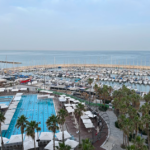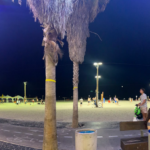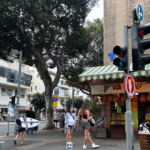Deep-Rooted Traditions
During the solemn moments of the seder, we pause to ponder a poignant line from the Haggadah: “In every generation, they rise against us, to annihilate us, but the Holy One, Blessed Be, saves us from their hand.” Yet, my nephew, Rabbi Yair Silverman, directs our attention to an equally crucial line: “In every generation, one is obligated to see himself as though he, personally, had come out of Egypt.” For my parents, survivors of the Nazi Holocaust in Hungary, this injunction resonated deeply. For newer generations, navigating today’s turbulent times may serve as their personal passage through “narrow straits”: (The Hebrew word for Egypt, “Mitzrayim” can also be translated as “narrow straits”.)
The celebration of Passover is deeply ingrained in Israel’s cultural fabric and extends beyond religious observance: 95% of Jewish Israelis, whether observant or not, partake in the removal of “hametz”, leavened bread products, from their homes and engage in some sort of familial or communal seder: This tradition transcends religious observance just as 97% of Jewish Israelis uphold the tradition of circumcision for newborn boys on the eighth day, irrespective of religious adherence, underscoring our collective commitment to our Jewish faith and heritage.
Observance and Celebration
Central to the seder is retelling our story of escape from the domination and slavery of Egypt and we do this by retelling our story and consuming matza, unleavened bread, and bitter herbs, “maror”, symbolizing both affliction and liberation. During the Passover Festival’s seven days (eight outside Israel), the first and last days mirror Sabbath observance, with most work and schools halted and shops closed. The intervening five days are semi-festive days, with shops and eateries operating while most schools and workplaces remain shuttered: These intermediate days are known for a tradition of leisure activities such as countryside excursions and museum visits, many offering complimentary access throughout the intermediate festive days.
Most years my family has participated either at the southern tip of Israel at the Dead Sea or in the Northern Galilee bordering Syria and Lebanon. This year, the ongoing conflict with Hamas and Hezbollah has reshaped Israel’s safety perimeter, prompting evacuations of southern communities bordering Gaza and northern communities adjacent to Lebanon and Syria. Over 100,000 families have found themselves internally displaced, many hosted in private hotels, paid for by the government, for the last six months.
Due to these safety reasons, my family this year opted for a beachside retreat in Tel Aviv for two of the intermediate days. During our stay in Tel Aviv, we encountered some of these long-term residents whose displacement and suffering is rarely acknowledged in international media narratives of the current conflict.
Life Amidst Conflict
Despite the turmoil of an ongoing war, thankfully, traditional and mostly normal life persists in most areas of Israel. On April 24th and 25th, I captured moments of normalcy along the extensive Tel Aviv beachfront, with people strolling, jogging, cycling, sailing, and swimming from dawn to dusk.
Yet, the spectre of conflict looms. Over 130 citizens remain captive in subterranean passages in Gaza. The people of Israel unite in prayer and advocacy for the release of the hostages and long-term peace and security in our homeland. The eradication of terrorist threats remains paramount for our collective safety. Even amidst these challenges, our faith in Israel’s destiny remains unshaken.
Ancient Prophecies and Contemporary Realities
As a testament to our faith, I share a poignant video circulating on social media, citing a passage from the Talmud dating back centuries. It predicts a time “when world leaders, including those from Persia (modern-day Iran) and Arabia (likely Saudi Arabia), will engage in conflict. Amidst the chaos, Israel will cry out in distress, but divine reassurance promises a unique redemption devoid of suffering and subjugation.”
The prescience of this ancient text amid today’s global upheavals is remarkable, reaffirming divine providence and the enduring destiny of the Jewish people. As the world’s gaze intensifies on Israel, we are entrusted with a metaphorical microphone to share our timeless message of peace and unity. May we witness the realization of prophetic visions, where peace prevails, and nations transform weapons of war into instruments of sustenance and brotherhood.
For anyone wondering how the current situation affects the mood of the average citizen of Israel, I quote from this Times of Israel article titled ‘Rockets Red Glare Bombs Bursting in Air Passover 2024.’
As we approach the seder, the night of many questions, I am struck by the one question that has haunted the last six months. It has choked us for air, narrowed the passage of the esophagus, magnified the racing beats of the heart, made the dreaded lump of the gut ever heavier and left the most articulate dumbfounded. A simple question. A frequent and ordinary one. Suddenly unbearable.
‘How are you?’
In Israel, this baseline greeting of civil society has become the mourner’s mirror, frightful to look into. When trying for an authentic answer, one is left to confront themselves, as with the forceful wet slap of a wave that unsettles the balance of our precarious footing.
With the shock and trauma of grief, horror of the unknown, and fear of what is yet to come, one popular response has emerged. The beloved poet Haim Gouri, depicting the challenges of social etiquette during an entirely different time in his poem Bakasha- Request ‘שלומי כשלום עמי’ ‘I am as my nation is.’ This reply deflects but also expresses the challenges of the moment from within an awareness of our social context. The blurred borders of our personal and communal identities at once horrify and console. I feel as my neighbor and nation feels. As such, I am not alone.



